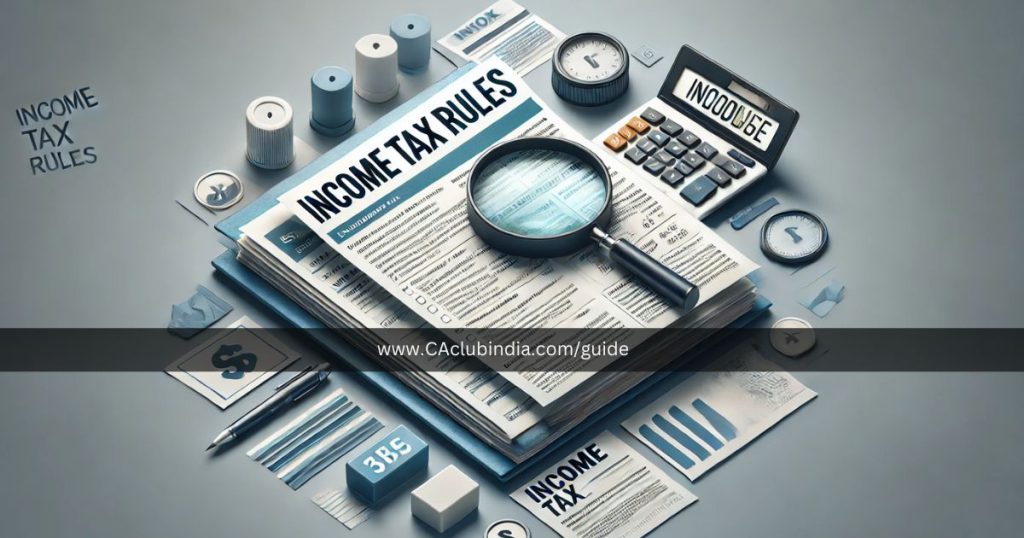Income Tax Rules are the guidelines which issued under the Income Tax Act, 1961. It cover areas like filing returns, income exemptions, deductions, calculating tax liabilities, and penalties for non-compliance.
Under the new income tax rules, there are provisions related to the waiver of interest on delayed payments.

The eligibility for such waivers mainly depends on the taxpayer’s specific situation, such as whether the delay in payment is due to genuine reasons or errors.
The government has provided certain relaxations for taxpayers, particularly for those affected by genuine hardships.
Key Eligibility Criteria for Interest Waiver on Delayed Payments
Genuine Hardship
If a taxpayer is facing genuine financial hardship or unavoidable circumstances (such as natural disasters, global health emergencies, or other events beyond their control), they may be eligible for a waiver of interest. For example, during the COVID-19 pandemic, the government provided relief on delayed payments.
Delayed Payments for Self-Assessment Tax
If the taxpayer has delayed the payment of self-assessment tax, but they file their tax return within the prescribed time limit, they may be eligible to request relief from penalties or interest.
Taxpayer Representation
In cases where interest is being charged due to delays, taxpayers can file representations or appeals to the income tax authorities. These appeals may include requests for interest reduction or waiver under certain conditions.
Advance Tax
Waivers or reductions in interest can be applied for if a taxpayer has missed advance tax payments. However, this is only possible if the taxpayer demonstrates that they could not make the advance payment due to specific challenges.
Notification by Authorities
The government, through official notifications, may provide specific timelines or relaxed conditions for certain categories of taxpayers to apply for interest waivers. These notifications may also outline the documentation required to support waiver requests.
Interest Waiver Under Section 234A, 234B, and 234C
- Section 234A: Deals with the interest for delayed filing of returns.
- Section 234B: Covers interest on unpaid or underpaid advance tax.
- Section 234C: Applies to delayed payment of advance tax installments.
Taxpayers who make a valid request for waiver due to special circumstances may benefit under these sections.
Government Directives
Often, if there is an official directive from the Ministry of Finance or the Income Tax Department (as was seen during the COVID-19 period), taxpayers may be eligible for an automatic reduction or waiver of interest on delayed payments.
How to Apply for an Interest Waiver
Formal Application Process
Taxpayers who wish to request a waiver of interest need to file an application with the jurisdictional tax authority. The application must clearly outline the reason for the delay and include supporting documentation, such as financial records, medical bills, or other relevant evidence.
Section 119(2)(a) and Section 119(2)(b)
These sections of the Income Tax Act empower the income tax authorities to waive or reduce interest in cases where a taxpayer experiences genuine hardship. Applications under these sections are handled on a case-by-case basis, with decisions reflecting the taxpayer’s specific circumstances.
Online Application Portals
The Income Tax Department’s e-filing portal often provides forms for waiver applications, including Form 2 for relief under Section 119(2)(b). Taxpayers can log in to their accounts, fill out the relevant details, and submit applications for review.
Review Process
Once a waiver application is submitted, tax officers review it along with any evidence submitted. The process includes a detailed assessment of the taxpayer’s financial situation and the legitimacy of the claim. Tax officers may ask for additional information before making a decision.
Timeline and Response
The income tax authorities typically respond within a few months of the application, although response times can vary. Taxpayers are notified of the outcome via the e-filing portal, email, or postal communication.
It is advisable for taxpayers to closely follow official notifications and consult with a tax advisor or professional to ensure they qualify for any relief under the new rules.
FAQs
As Interest on TDS is not allowable expense as per provision of Income Tax Act, 1961.
Under Section 220(2A) of the Income Tax Act, taxpayers who miss the deadline for paying a demand notice amount are charged a 1% monthly interest on the overdue amount. However, in specific cases, senior tax officials can approve a waiver or reduction of this interest if certain requirements are satisfied.

